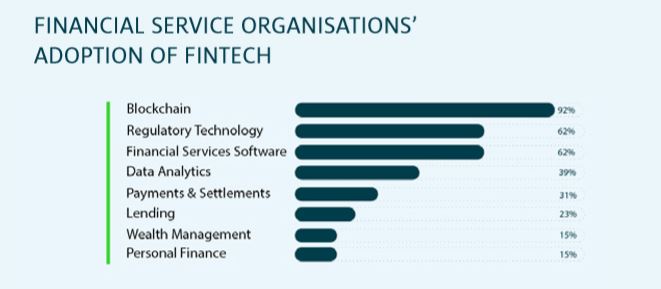Published Wednesday 5th February 2020
The Financial Services landscape is fundamentally changing. Progressive organisations are needing to shift to accommodate the opportunities and challenges created by new technologies and evolving customer needs. Technology has become and will remain an integral part of Financial Services delivery, and financial institutions are increasingly becoming technology firms.
FinTech
Financial Technology (FinTech) is used to describe new hardware, software and algorithms that seek to improve and automate the delivery and use of Financial Services.
At its core, FinTech is utilised to help organisations and consumers better manage their financial operations and processes. Financial institutions are getting more than comfortable partnering with, and in many ways acting like FinTech’s. More and more we see them digitising processes, leveraging and making decisions based on data and analytics, and focusing on consumer experiences that extend beyond web and mobile devices, and doing so at agile speeds by adopting new delivery cultures. The sector is learning that to contend with an evergrowing group of competitors, and to maintain relevancy and market share, they need to be more strategically aware and technologically advanced to be able to respond to consumer expectations. As such there is a keen focus on core modernisation, consumer channel innovation, business process automation and digitisation as they strive to become more digital. We see efforts regarding innovation only increasing in 2020, as FinTech’s, tech giants, and even regulators revolutionise and transform the Financial Services landscape. Ultimately, the consumer will be front and centre as drivers for businesses to continue to accelerate their investments in innovation and digital enhancements.
Technological Change
In the Financial Services sector today the accelerating pace of this technological change can be a creative force, but also difficult to navigate. Firms must embrace technology as it impacts every facet of the business. Artificial intelligence, robotics, big data and blockchain are transforming the industry. Technology will determine which firms are the winners in a fast-changing landscape. The promise of blockchain technology has been cited for several years now. Many sceptics are beginning to wonder if it will ever really arrive. Blockchain isn’t a cure-all, but there are clearly many problems for which this technology is the ideal solution. We continue to see banks, brokerages, insurers, regulators and others actively testing ways to harness the benefits of blockchain. The journey has only just begun. Cybercrime is an ongoing challenge and the speed and the consequences are increasing. Businesses need to balance being open with being secure. As attacks increase and regulators take closer notice, the pressure to act mounts. By recognising that hackers will find vulnerabilities, leaders can improve the way they design and deliver services, manage risks and train their teams. Supply chain complexities are not limited to hardware. Financial Services organisations are prolific users of software and their associated licencing agreements. This is an area littered with complications and costs that are often not well understood, and managing a user network across single-site, national and international locations can be a daunting task.
Marketplace
The marketplace for IT solutions is increasing in competitiveness and complexity, not least because of FinTech disruptors. These fast-moving companies, often start-ups, are focused on innovative technologies or processes in everything from mobile payments to insurance.

This sector is making some of the most profitable contributions to the Financial Services value chain. Technology will help to drive successful changes in this market, helping to realise more innovative business models, provide better management and improve standards. Being able to quickly and effectively implement technological change will ensure the best chances of success. Organisations’ cultures and operating models must adapt to this new reality. This may mean embracing new routes to profitability, new approaches to customer engagement and seeking support in the identification and delivery of technology solutions.
2020 and Beyond
Financial Services is currently experiencing a period of great momentum toward modernisation; there has been no other time quite like this in the sector. The industry is at the confluence of major technology advances, ever increasing customer expectations, stiff competition and massively complex regulatory precedence. The year 2019 held more change and innovation in Financial Services than in years previous, and surely 2020 will further increase this pace of change, with the potential for many inventive and creative collaborations, advanced modernisation, adaptive business models and exciting innovations. Developing strong partnerships with the supply chain is a positive step that will open opportunities for greater growth and transformation in the future. There are significant opportunities for Financial Services organisations to embrace emerging technology in the drive towards reducing operational costs and improving efficiency.

About the Author: Richard Placito, has been leading and implementing Business Process Management (BPM) programmes for over 20 years. He now utilises this experience and expertise to offer services and support to Expense Reduction Analysts’ clients. The results are rapid, effective and permanent.
01905 412173